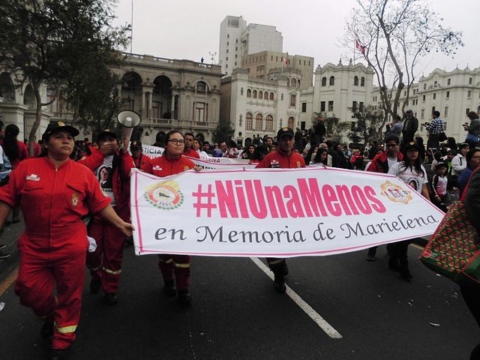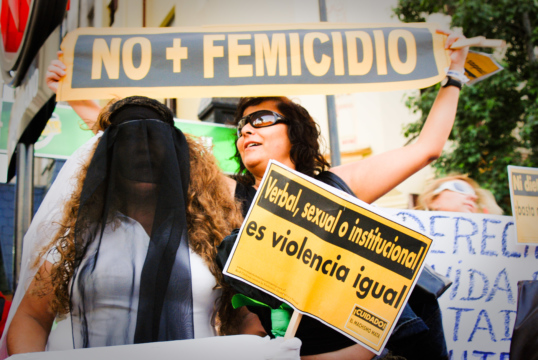
Activism Against Gender-Based Violence on the Rise in LAC
The widespread outbreak of activism against gender-based violence in Latin America has captured the media and world’s attention.
This post is also available in: Spanish
More than half of the countries with the highest number of femicides are located in the Americas. In 2018, at least 3,529 women in the LAC region were victims of femicide. In Ecuador, Uruguay, and Peru, femicide at the hands of an intimate partner exceeds 85 percent of the total deaths of women in the country. Violence against women (VAW) encompasses a wide range of acts from verbal harassment to other types of emotional, physical and sexual abuse, and femicide is the most extreme manifestation of VAW.
Most incidences of VAW occur in intimate settings, according to couples and former partners. This type of violence tends to be normalized in the context of machismo culture predominant within Latin American households, as explained in “Activism against Gender-Based Violence on the Rise in LAC.” In the first quarter of 2019, the Executive Secretariat of the National Public Security System reported 60,384 cases of domestic violence in Mexico, an increase of 4 percent over the previous year.
In this context, the coronavirus pandemic and subsequent government responses have had a severe impact on certain vulnerable segments of the population in Latin America. Lockdowns force women to go home with their abusers without access to support or aid services. Furthermore, the shutting down of businesses, the absence of social engagement, economic uncertainty, and increasing unemployment create tensions within the household that could trigger a rise in tensions that lead to domestic violence. In response to this intensified crisis, governments and other societal actors have had to quickly implement new forms of outreach, adapt their resources to fit a Covid-19 reality, and develop new partnerships to widen their impact.
The recent pandemic has exacerbated economic inequality, made care work more burdensome and dangerous, and increased gender-based violence. Before the lockdown, women carried out three to four times more housework than men in Latin America. In addition, online schooling requires women to spend more time on housework and childcare than before. In the region, women represent 59 percent of the informal sector. Lockdown practices have limited financial independence of women as they are more at risk of losing their jobs.
In several countries of the region, such as Argentina, Brazil and Chile, there has been an increase in calls and reports of domestic violence since the beginning of the lockdowns. Abusers usually restrain the liberty and mobility of their victims, so the lockdowns provide a new platform of control for the abuser.
In some countries, the opposite has occurred. In the Dominican Republic, a country with the fifth highest rate of femicides in Latin America and the Caribbean, there has been a 50 percent decrease in the number of reports of gender violence. Experts note that this does not mean that violence has disappeared. Their domestic circumstances may not allow many women to report abuse privately. Others may fear the sickness and potential death that could result if they were to leave home to report violence or seek shelter more than their abusive living situation.
Misinformation surrounding the lockdowns and government restrictions has played a large role as well. Some victims do not know if they are able to leave their homes safely without being fined or arrested, especially if the government has not been explicit about lockdown exceptions. For that reason, the Argentinian government openly states that women and LGBTQ people experiencing violence are free to violate the quarantine to seek help.
The recent pandemic has exacerbated economic inequality, made care work more burdensome and dangerous, and increased gender-based violence. Lockdown practices have limited financial independence of women as they are more at risk of losing their jobs.
Governments in Latin America have taken certain measures to ensure that support networks and legal resources are still available for domestic violence cases during the pandemic. Once the lockdowns began, Argentina and Uruguay automatically extended precautionary protection measures for victims of gender-based violence. These either expired in the last 40 days or will expire within the quarantine period. In São Paulo, Brazil and Colombia, authorities issued a decree to guarantee continued access to services virtually, including legal counsel, psychosocial advice, and police and justice services, including hearings.
In the region, Peru, Panama, and Colombia have adopted restrictions on mobility based on gender. Even though these restrictions are adopted with the goal of preventing the spread of Covid-19, gender restrictions on mobility could also present a viable escape valve for women in situations of domestic violence. Women can leave home without their abusers to seek help and access support services. On the other hand, policies based on biological sex can be counterproductive to the LGBTQ community and expose them to more violence on the streets.
In light of mobility restrictions, governments have resorted to technology to maintain services for domestic violence cases. In Argentina and Chile, authorities have included a WhatsApp number to support helplines in receiving reports. WhatsApp and text messages are a preferable resource because they provide a more discrete way for the victim/survivor to reach out for help. These platforms also offer mental health and legal services.
Blockchain technology is another resource that has gained popularity for reporting. Blockchain is a digital protocol that creates an unalterable documentary record. This feature has allowed new applications to use the internet to document, time-stamp, and establish key evidence. UrSafe is an app that uses blockchain technology to record calls and sounds around the device which could be later used to support legal actions against abusers. Currently, the app is free during the time of the emergency period in Latin America.

Social media is also an essential platform for governments to advertise helplines and support services. Campaigns have tried to make domestic violence a more visible issue in the Covid-19 context. In Mexico and Colombia, campaigns like informative guides #HeForSheDesdeCasa and #MujeresSegurasenCasa were launched.
Nevertheless, technology has its limitations in reaching women outside of urban areas and capital cities in the region. Internet is still considered a luxury in impoverished areas. Globally, women are 21 percent less likely to own a mobile phone, so technology-based solutions could exclude women in rural areas and low-income neighborhoods.
Civil society organizations (CSOs) and private companies have played an important role compensating for the limitations of state responses to domestic violence. Shelters in Mexico and Argentina have been declared essential services to ensure their continued operation. Governments are building alliances with the private sector to expand facilities to house people in need of shelter. In Argentina, the Minister of Women introduced “Plan H” in partnership with hotels and student residences. Plan H aims to house people identified from calls to the helpline 144.
Pharmacies have also proven to be crucial allies in expanding support networks. In Argentina, the initiative Barbijo Rojo (red mask) is a joint effort of the Ministry of Women, Gender and Diversity and the Argentine Pharmaceutical Confederation. Women in need of help can go to pharmacies and ask for a red mask. This is a code that alerts staff to call the helpline 144.
CSOs play a fundamental role in keeping governments accountable. These organizations often provide crucial legal support and mental health services. They also encourage more transparent communication among different societal actors. In Bolivia, a pregnant girl who violated the curfew to access the hospital was forced by the military on the street to go back home. Breeze of Hope, an NGO, mediated between local authorities and hospital facilities to get the medical help needed.
The involvement of private companies in these awareness campaigns has also helped reach a wider audience through social media. Avon and Natura, companies with enormous presence in the region, have implemented initiatives to raise awareness of domestic violence before and during the pandemic. Avon launched the campaign #AisladasNoSolas. This outreach strategy uses silent videos to disseminate different helplines and support networks among their customers on social media without alerting abusers.
👉🏽 Mañana vuelve nuestro ciclo de charlas en vivo sobre violencia de género en tiempos de aislamiento.
— Fundación Avon Argentina (@FundacionAvon) June 15, 2020
Nos encontramos a las 19 hs para compartir una charla entre @unaveraporahi y @anainesalv de Fundación Avon en nuestra cuenta de Instagram. #AisladasNoSolas #ViolenciaDeGénero pic.twitter.com/MVOhgQzNyO
Covid-19 has brought on new challenges for governments to address regarding domestic violence and VAW in the region. Efforts to tackle VAW are still hobbled by the lack of regional coordination around establishing a cohesive definition of and criteria for terms such as femicide. It is important that governments mobilize resources to standardize their data collection and legal framework of VAW in the region. This will allow a better assessment of the state of gender-based violence in the region and enhance policy efforts.
To address the increase of VAW, civil society organizations should continue documenting and sharing data to hold key stakeholders accountable and ensure that this issue is at the forefront of state responses to Covid-19.
Likewise, the government should emphasize the key role of social networks in neighborhoods. Campaigns must raise awareness of the importance of reporting sexual violence. Research has proven that bystander training, involvement of leaders and influential social referents are effective interventions against domestic violence and/or VAW.
Lastly, even though the spike in domestic violence is gaining more coverage in the media, there is a need for measures to address domestic violence and VAW through an inter-sectional lens. Migrant, indigenous, older, and transgender women are vulnerable groups who often get overlooked by these policies.
Melanie Ordóñez is an undergraduate student at the Elliott School of International Affairs at George Washington University. She was an intern with the Office of the President.
Covid-19 in the Americas: The Dialogue’s Coronavirus Updates
Covid-19 in the Americas: The Dialogue's Coronavirus Updates
The widespread outbreak of activism against gender-based violence in Latin America has captured the media and world’s attention.
Recent protests for increased abortion access in Argentina, Brazil, Chile and beyond underscore the relationship between female insecurity and lack of access to reproductive healthcare in the region.
This post is also available in: SpanishIn Latin America, violence against women and girls is pervasive and practiced with relative impunity. According to a November 2017 United Nations Development Program Report, Latin America has the highest rate in the world of gender-based sexual violence against women, and in Central America…

